 Petzlover
Petzlover Bergamasco is originated from Italy but Polish Lowland Sheepdog is originated from Poland. Bergamasco may grow 12 cm / 5 inches higher than Polish Lowland Sheepdog. Bergamasco may weigh 15 kg / 34 pounds more than Polish Lowland Sheepdog. Both Bergamasco and Polish Lowland Sheepdog has same life span. Both Bergamasco and Polish Lowland Sheepdog has almost same litter size. Both Bergamasco and Polish Lowland Sheepdog requires Moderate Maintenance.
Bergamasco is originated from Italy but Polish Lowland Sheepdog is originated from Poland. Bergamasco may grow 12 cm / 5 inches higher than Polish Lowland Sheepdog. Bergamasco may weigh 15 kg / 34 pounds more than Polish Lowland Sheepdog. Both Bergamasco and Polish Lowland Sheepdog has same life span. Both Bergamasco and Polish Lowland Sheepdog has almost same litter size. Both Bergamasco and Polish Lowland Sheepdog requires Moderate Maintenance.
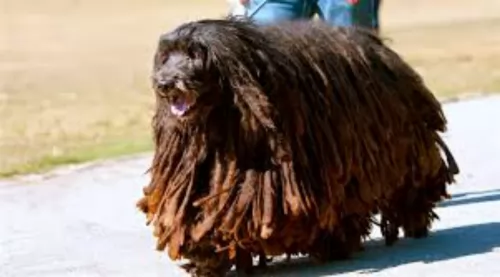 The Bergamasco comes from northern Italy. This medium sized sheepdog is of ancient origin. Known as an Italian sheep herding breed, his name actually comes from the town where he comes from - Bergamo.
The Bergamasco comes from northern Italy. This medium sized sheepdog is of ancient origin. Known as an Italian sheep herding breed, his name actually comes from the town where he comes from - Bergamo.
It was after World War II that there was danger that this breed would disappear as the need for herding and shepherding was diminishing. An Italian breeder, however, Dr. Maria Andreoli, stepped in to save the breed.
It was in 2015 that the American Kennel Club also changed the breed’s status from Miscellaneous to the Herding Group.
 Hailing from Poland, the Polish Lowland Sheepdog is believed to have descended from herding dogs as well as the Puli and Tibetan Terrier.
Hailing from Poland, the Polish Lowland Sheepdog is believed to have descended from herding dogs as well as the Puli and Tibetan Terrier.
Later these dogs were bred with local Scottish dogs to bring about Scottish herding dogs, the Bearded Collie. The dog was accepted by the Federation Cynologique Internationale in 1959. In 2001, the American Kennel Club recognized the Polish Lowland Sheepdog as a breed in the Herding Group.
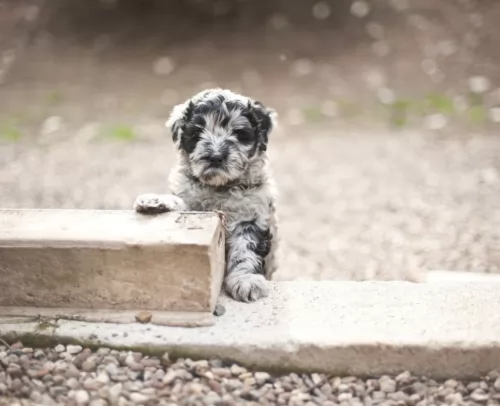 This medium sized sheepdog stands 54 – 62cm in height and weighs up to 38 kg as an adult. It is his coat which draws the most attention. It is of a coarse texture and actually greasy to the touch. It actually forms into strands or almost like dreadlocks from the top of the body, so that people agree he is one of shaggiest dog breeds there are.
This medium sized sheepdog stands 54 – 62cm in height and weighs up to 38 kg as an adult. It is his coat which draws the most attention. It is of a coarse texture and actually greasy to the touch. It actually forms into strands or almost like dreadlocks from the top of the body, so that people agree he is one of shaggiest dog breeds there are.
From age 1 on the coat starts to become woolly, and then the flocks start to form. As these clumps of hair appear, it will become necessary to separate them into smaller cords by hand to ensure attractive formation Brushing isn’t necessary but a big toothed comb can keep their hair ‘groomed’.
The colour of the coat is solid grey with patches of shades of grey and sometimes black. His dense, heavy coat makes it that he is suited to cooler climates. Because he is a herding dog, he wouldn’t do well in an apartment but would suit a home with a large garden.
He is intelligent and social but will need firm handling as he is a boisterous dog. He has a muscular yet compact body with a large head, long tail, high-set semi-drooping ears and large, gentle looking brown eyes. Although not instinctively aggressive, he makes an excellent watch dog with strong protective instincts to protect his human family.
He views new people into his circle with suspicion and wariness. He is good with kids and pets in the home and is playful and energetic.
 The Polish Lowland Sheepdog is a medium-sized dog. Both males and females stand between 42cm to 50 cm in height and they weigh roughly between 14 and 23kg.
The Polish Lowland Sheepdog is a medium-sized dog. Both males and females stand between 42cm to 50 cm in height and they weigh roughly between 14 and 23kg.
The dog has a double coat which can mostly be white, cream, gray, brown and black. The underdoat is soft and dense with the top coat being straight or wavy and being medium length.
There is quite a bit of hair around the facial area. The eyes are alert and brown and the ears medium size, high set and then drooping down. The tail has always been attractively docked, giving the dog an attractive, compact look but these days it is often just left long.
Lively, bright as a button, clever, social and feisty, the Polish Lowland Sheepdog is easy to train, becoming obedient and well balanced. The Polish Lowland Sheepdog is such a self confident dog and he will fit happily into life in the city or the countryside, loving spending time with his human family.
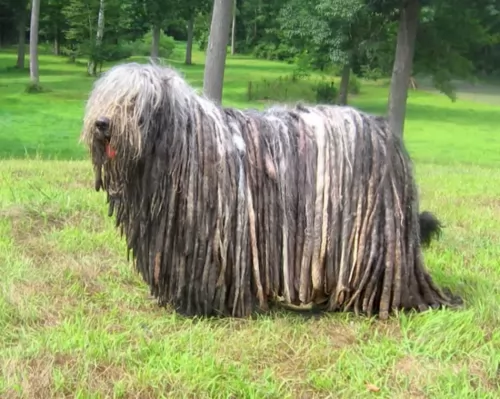 This is a working dog so they are naturally alert. He is also intelligent and independent and this independence is seen with training as he doesn’t take easily to following instructions, becoming stubborn. You’ll certainly want to have your Bergamasco socialized and trained as he can be a boisterous dog, bounding with energy.
This is a working dog so they are naturally alert. He is also intelligent and independent and this independence is seen with training as he doesn’t take easily to following instructions, becoming stubborn. You’ll certainly want to have your Bergamasco socialized and trained as he can be a boisterous dog, bounding with energy.
This is a dog that will need to be kept busy and provided with plenty of activities so that he remains happy, playful and relaxed.
Lively and intelligent, these dogs also form strong bonds with their owners and get on well with the children in the home. He will take well to country life as opposed to living in the city.
 The PON is an independent, self-willed dog but he can also be entertaining and amusing. He is a social, friendly dog but for many people, his long hair and grooming requirement might prove to be a bit of a handful.
The PON is an independent, self-willed dog but he can also be entertaining and amusing. He is a social, friendly dog but for many people, his long hair and grooming requirement might prove to be a bit of a handful.
Your dog is energetic, cheerful and playful and when he isn’t around, it will be like some sunshine has gone out of your life. He is faithful and loving towards his human family but is aloof towards strangers. Bring one of these dogs into your home and you’re guaranteed to have a remarkable friend and pet for many years.
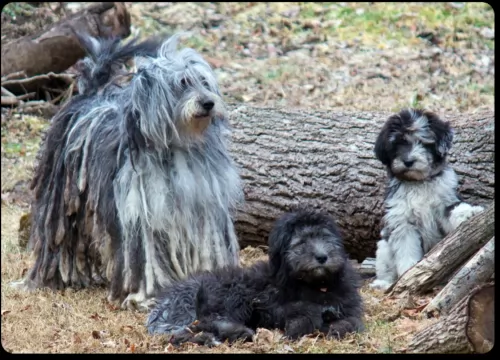 Your Bergamasco can live to be 13 to 15 years of age and he is considered to be a healthy breed. Nonetheless you want to be aware of health issues that are common to this breed
Your Bergamasco can live to be 13 to 15 years of age and he is considered to be a healthy breed. Nonetheless you want to be aware of health issues that are common to this breed
he is vulnerable to heat. He can die of heat exhaustion quicker than other breeds
keep an eye on him for hip dysplasia, progressive retinal atrophy and skin allergies
 These dogs are generally healthy and the dog’s life expectancy is about 12 years. Nonetheless there are some problems to be aware of. For instance, with this dog, hip dysplasia is a real problem.
These dogs are generally healthy and the dog’s life expectancy is about 12 years. Nonetheless there are some problems to be aware of. For instance, with this dog, hip dysplasia is a real problem.
The Orthopedic Foundation of America evaluated the hip X-rays of hundreds of these dogs and found a large percentage were dysplastic.
Hereditary eye disease can also occur with this dog. Macular degeneration is a common eye disorder that can cause central vision loss. Many genetic abnormalities can cause degeneration of the image forming part of the eye. Unfortunately these conditions can result in total blindness. Parts of the retina can also degenerate with age.
Skin allergies are also an ever present threat with your dog. Itchiness and pain can be a nightmare for your pet and scratching and licking brings no relief – just aggravates the condition. You will certainly need to get your pet to the vet as skin allergies and skin diseases can make your beloved canine miserable.
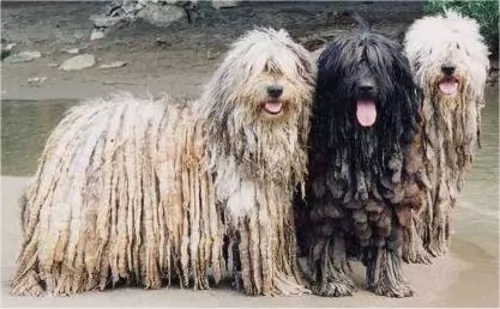 The Bergamasco isn’t a shedder but his coat will need to be combed once a week just to keep it in order. You don’t want to bath him too often, especially during the Winter as his coat takes a long time to dry. It isn’t recommended to shave a Bergamasco as the coat regulates the dogs temperature – keeping him warm and cold as the weather demands.
The Bergamasco isn’t a shedder but his coat will need to be combed once a week just to keep it in order. You don’t want to bath him too often, especially during the Winter as his coat takes a long time to dry. It isn’t recommended to shave a Bergamasco as the coat regulates the dogs temperature – keeping him warm and cold as the weather demands.
They thrive on a blend of kibble (dry) mixed with raw and-or moist food once or twice a day. Remember to include quality chicken, turkey, etc. mixed with some vegetables and rice into your dog’s diet. Ensure a constant supply of fresh water in an easily-cleanable bowl.
Balls and ropes are important for building muscle strength and burning energy. Remember your Bergamasco is a working breed and will need plenty of games and exercise.
 Your Polish Lowland Sheepdog is like a big Bear and his long, shaggy coat will require regular brushing, otherwise it could become full of burrs and grass.
Your Polish Lowland Sheepdog is like a big Bear and his long, shaggy coat will require regular brushing, otherwise it could become full of burrs and grass.
Many people prefer to take their dogs to a grooming parlor where the hair is cut, the nails trimmed, the teeth cleaned and the ears checked.
Provide your Sheepdog with a nice warm, dry cozy spot that is his and where he can quietly retreat.
If your Polish Lowland Sheepdog spends time outdoors, make sure he has access to both shade, sun and shelter in case it rains. There must always be a bowl of fresh water outdoors too.
It is better to give your adult Polish Lowland Sheepdog 2 smaller helpings of food as opposed to one big bowl. Puppies will need 4 bowls of food a day. Two bowls will ensure your dog doesn’t gobble up his food and create digestive problems and bloat.
High-quality dry dog food will provide a balanced diet, but you want to make it a little more delicious for him occasionally by mixing in chopped up boiled chicken, brown rice, sweet potatoes, carrots and spinach. Just a tad of raw meat occasionally can also be of huge benefit.
Fresh, cool water should always be available around the clock. Be sure to keep his food and water dishes clean.
Have your dogs spayed or neutered if you don’t want them to have puppies.